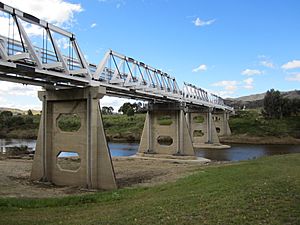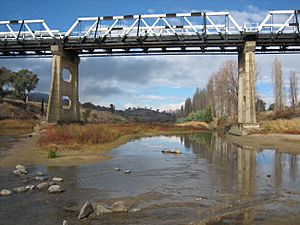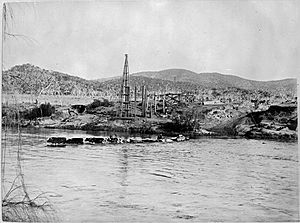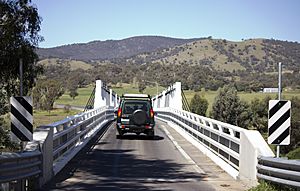Tharwa Bridge facts for kids
Quick facts for kids Tharwa Bridge |
|
|---|---|

Tharwa Bridge is an Allan truss bridge over the Murrumbidgee River (looking North)
|
|
| Carries | Tharwa Drive |
| Crosses | Murrimbidgee River |
| Characteristics | |
| Design | Allan truss |
| Material | timber |
| Total length | 598 feet (182 m) |
| Width | 15 feet (4.6 m) |
| Number of spans | 4 |
| Piers in water | 2 |
| Load limit | 5 tonnes |
| History | |
| Designer | Percy Allan |
| Constructed by | McClure Bros |
| Inaugurated | 27 March 1895 |
The Tharwa Bridge is a special bridge with four sections, called spans. It uses a design known as an Allan truss. This bridge helps people cross high above the Murrumbidgee River. It connects Canberra with the small village of Tharwa. This bridge is the oldest one still standing in the Australian Capital Territory.
Contents
How the Bridge Was Built
The Tharwa Bridge first opened on March 27, 1895. It was a big day for the area! A public holiday was even announced. About 1500 people gathered in Tharwa to watch the opening. Mrs. Elizabeth McKeahnie, who was the oldest person living there, officially opened the bridge.
Engineers designed the bridge to be high enough to avoid floods. They based its height on the highest flood ever recorded before it was built. Since then, the river has never flooded over the top of the bridge. You can even see a mark on the concrete support on the western side. It shows how high the water got during a flood in 1991.
Why the Bridge Is Important

The Tharwa Bridge is very important to the history of the Australian Capital Territory. It was added to the ACT Heritage Register in 1998. This means it is officially recognized as a special historical place. The National Trust of Australia also lists it as important.
Engineers Australia gave the bridge a special award called a Historic Engineering Marker. This award is part of their program to recognize important engineering projects. The Tharwa Bridge is seen as one of the most significant historical structures in the ACT.
The bridge is special because of its Allan truss design. This type of structure was new technology at the time. It was used by Percy Allan to build timber road bridges in New South Wales. The bridge still looks and works almost exactly as it did when it was first built.
Local people in Tharwa really value the bridge. It helps their community in many ways, including social and economic life. It also looks beautiful. The bridge reminds everyone of the European settlement and growth of the region in the 1800s.
Keeping the Bridge Safe
Engineers checked the bridge in 1978. They made some improvements to keep it strong. However, over time, the bridge started to show wear and tear.
In April 2005, the bridge had to close. A check found a lot of wood rot, which was caused by termites. This damage affected important parts of the bridge. To help, temporary Bailey panels were added in July and August 2005. These allowed light vehicles (under 5 tonnes) to cross. This temporary fix was meant to last until 2008.
In September 2006, the bridge closed again for a long time. Barriers were put up to stop cars, bikes, and people from crossing. Traffic had to use a different, lower crossing called Point Hut. If that crossing also closed due to floods, the only other high bridge was much further away at Cotter.
In October 2006, the ACT Government planned to build a new concrete bridge next to the old one. This new bridge would have one lane and a path for people walking. Work was supposed to start in 2007. But this plan changed. Instead, they decided to fix the old bridge. Repair work began in April 2008.
The bridge reopened in August 2008 for light traffic (vehicles under 5 tonnes). The second part of the repair project finished in February 2010. This work made the bridge's foundations stronger to handle big floods.
The third and final part of the restoration meant closing the bridge again. Workers replaced the timber parts and added a new timber deck and steel railings. The bridge reopened to the public on June 24, 2011. All the work was fully finished by September 2011.
The bridge also closes for regular maintenance. For example, in July 2018, it closed for three days. This was to tighten the bridge's decking and other parts. Weather can make these parts expand or shrink, so they need regular checks.
Images for kids
 | John T. Biggers |
 | Thomas Blackshear |
 | Mark Bradford |
 | Beverly Buchanan |







